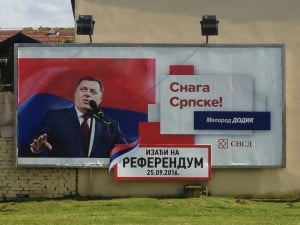Report from Banja Luka during the September referendum on Republika Srpska Day
Update: The outgoing Obama Administration announced on Jan. 17 that the U.S. imposed economic sanctions on Republika Srpska President Milorad Dodik.
Bosnian Serbs are celebrating Republika Srpska Day, a holiday banned by Bosnia’s Constitutional Court. And, rather than caving to international pressure, the Bosnian Serbs are ratcheting up their festivities.
Republika Srpska Day, which takes place on Jan. 9, marks the day in 1992 on which Bosnian Serbs declared independence in the lead-up to the Bosnian War. Jan. 9 also happens to be St. Stephen’s Day, an Orthodox Christian holiday.
More than 20 years following the end of the Bosnian War, ethnic division is arguably more pronounced in the Balkan state than it was in the lead-up to the fighting that killed about 100,000 people in the 1990s. Bosnia is still governed by the Dayton Agreement, which divided the country into a Serb-dominated entity and a Bosniak (Bosnian Muslim)-Croat-dominated entity. The Dayton Agreement was former U.S. president Bill Clinton’s signature foreign policy achievement.
Last year, the Bosnian Constitutional Court slapped a ban on the Serb statehood day, saying it discriminates against non-Serbs living in Republika Srpska. Republika Srpska President Milorad Dodik then called for a referendum on whether or not the Bosnian statelet should continue celebrating its holiday.

The Constitutional Court responded by slapping a ban on the referendum, but Republika Srpska went ahead with the vote anyway.
Last September, 99.8 percent of voters declared their support for the holiday. Turnout in the referendum was near 60 percent, according to Bosnian Serb government figures.
The referendum was a victory for Dodik, who defied the international community by holding the vote. The west deemed the referendum illegal, and Serbia refrained from supporting it. Only Russia gave a stamp of approval to the vote.
A week following the referendum, Dodik’s party scored a sizeable victory in the Bosnian regional elections.
Critics of Dodik say the Republika Srpska Day vote was a test run for a referendum on secession from Bosnia. Dodik has threatened multiple times to call a referendum on secession if the Bosnia state does not comply with his demands.
The West, which backed Dodik in the late 1990s, is now overwhelmingly opposed to his policies. However, Dodik has succeeded several times in defying the orders of Bosnian state institutions and the international community.
The only recent repercussion Dodik has faced was being denied a visa to the U.S. to attend President-elect Donald Trump’s inauguration or after-party.
While alienating the West, Dodik has managed to forge ties with Russian President Vladimir Putin. The Russian president offers Dodik political backing, though Putin offers little to support Republika Srpska economically or militarily.
Still, Republika Srpska acts as a hedge against NATO expansion in the Balkans. Also, due to the ethnic tension and dysfunctional national government in Bosnia, the country’s European Union membership process is progressing at a snail’s pace.
On Monday, Serbs from Bosnia and elsewhere are descending upon Banja Luka, the de facto capital of Republika Srpska. Planned festivities include Republika Srpska’s largest-ever parade, as well as musical performances and art displays.
Serbian President Tomislav Nikolic and other Serbian government officials are in attendance. Their trip to Bosnia has upset the Bosniak leadership in Sarajevo.
Following Republika Srpska Day, Dodik is expected to make preparations for another referendum challenging the Bosnian state. It is unclear what exactly that it might entail. Dodik has threatened to hold a a secession referendum on secession by 2018.
